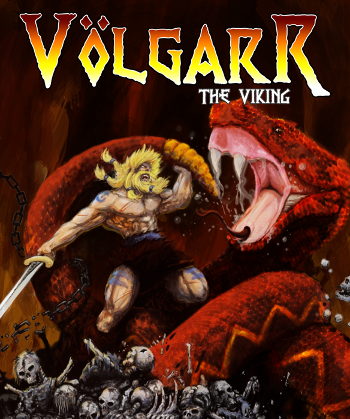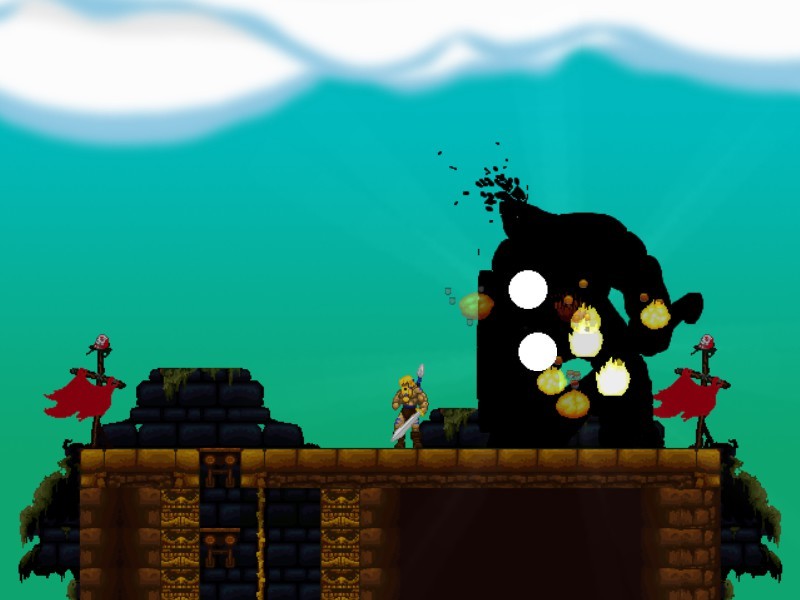Indie Game of the Week 83: Volgarr the Viking
By Mento 4 Comments

I sort of knew what I was in for by booting up the legendarily brutal Brad-breaker Volgarr the Viking, but curiosity kills cats and Norseman alike. Besides, you can't really get a measure of a game until you have it in your hands and can see for yourself the way it controls and flows and can piece together in your mind what it is about the game that you personally hate. OK, maybe that's just the salt talking.
Volgarr the Viking is an Adult Swim Games published, Crazy Viking Studios developed masocore platformer that specifically hearkens back to the breed of 2D side-scrollers that only gave you so many opportunities for failure before figuratively slapping the drumsticks out of your hand and telling you to start the whole thing over but better and faster. At the time, there were understandable reasons why games were made like this: a new game would take thirty minutes to complete if you played through it start to finish with no setbacks for death, and if that was bad news for a $60 home console purchase bought earlier that same day it was extra bad news for the arcade machines that needed a constant diet of currency to turn a profit. It was also the case that developers had to focus test their own games, inadvertently adjusting a game's difficulties to their own ability rather than that of the average player. These considerations are no longer applicable in this modern age of video gaming - the industry has since found other carny tactics for bilking its audience, notably lootboxes and pre-order DLC - unless your goal as a developer is to invoke the difficulty of those ancient games for the sake of misdirected nostalgia, which is where we get Volgarr the Viking.
I want to state something specific about what game difficulty is and how certain types of it are more disingenuous than others. It's something I've struggled to articulate for as long as I've been blogging here - one of my earliest blogs some seven and a half years ago attempted to get to the root of "bad" versus "good" difficulty. One conclusion I've reached after several years is that there is little compelling about "endurance" difficulty; which is to say, seeing how long you can go with a moderately tough game before you eventually choke. Volgarr's various instances and obstacles added together don't amount to a truly difficult game if you take your time and memorize when and where the next attacks are coming from. Rather, the fact that it drops you back so far after death and forces you to repeat sequences which you've mastered several times before doesn't so much qualify as difficulty but busywork. You aren't being challenged as much as being harangued; endlessly inconvenienced rather than facing new hurdles and rising above them. Unless it's one of the bosses, the chances are you aren't dying on one area in particular but across a number of areas you've defeated more often than not.

Per contra (and per Konami's Contra), there's not a whole lot a game designer can do to make a platformer more difficult beyond an artificial scarcity of checkpoints and some extremely limited exoneration for failure. It's why a lot of Indie platformers tend to be puzzle-platformers, in which a share of the difficulty comes from solving the conundrums at their core (as is the case with a certain other Viking-themed platformer), or spacewhippers, in which the challenge comes from determining where to go next and risking high-level areas off the game's intended path for what advantages can be found there. The genre of 2D platforming has expanded over the years for the sake of necessity, incorporating new ideas for challenges along the way, because the old model was no longer sustainable. Volgarr doesn't even provide what the few successful masocore platformers do: Super Meat Boy has its alacrity and deliberately bite-sized stages where a successful run would take only seconds; the new Dead Cells and its spiritual predecessors of sorts Rogue Legacy and Salt & Sanctuary offer savage hardships but also allows for a system of character development with which to better overcome those hardships when skill alone is insufficient. Volgarr does provide some entertainment in how it brings us back to the inadvertently cruel games of our youth in a knowing fashion - the whole point, before anyone accuses me of missing it - but it's a reminder if we needed one that game design has long since moved on with good reason.
Rating: 3 out of 5.
| < Back to 82: Endless Legend | > Forward to 84: Last Day of June |
